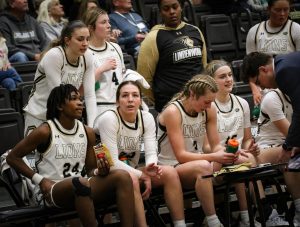Eating disorders, body image in college

Drawing from the “Love Your Tree” campaign.
October 4, 2021
Lindenwood University will sponsor a program in the spring that can help students focus on self-compassion, body acceptance and mental well-being.
Counselors said it’s the type of program that’s needed on college campuses.
“Working on a college campus, we see a lot of students that struggle with body image and eating disorder behaviors,” said Dawn Meyer, a counselor in the Counseling and Resource Center. “The Student Counseling and Resource Center is here to help our students get the support they need and deserve through counseling services, groups, and resources. Please reach out to us if you are struggling or have any concerns about challenges you are facing.”
The Counseling and Resource Center will be hosting a group called “Love Your Tree”, used as a metaphor to define the self or body as a tree using symbolism and examples in nature. This group will be focusing on self-compassion, body acceptance and positive mental well-being through creativity, community connection, and self-reflection.
College is a place where students often compare themselves with other students and develop this feeling of competition among one another, according to Eating Disorder Hope.
“When I got to college I thought I had to fit a body type and that if I wasn’t thin I wasn’t pretty,” senior Lindsay Mosher said. “I think college plays a huge role in body image. I hate to say it, but it’s never been something I have been worried about at work or in any other setting than school.”
Students who are able to manage their stress at home can feel trapped in college due to having to stay at school most of the time. As a result of this, some students develop eating disorders by replacing the control they had with their food with obsessing over their body image, according to the Child Mind Institute.
According to the National Eating Disorder Association, a website dedicated to helping people with eating disorders, around 30 million Americans will struggle with an eating disorder in their life, and a lot of them are going to start in college.
Depending on the person, food can be a way to relieve or add on stress.
Junior Isaac Fuentes said he sometimes eats too much when he gets stressed.
“I would get in snowball panic attacks and stress eat which would cause me to get into a loop,” junior Isaac Fuentes said “I think being on my own and just having all these new stresses I used food as an outlet for relief.”
A poll on Instagram made by a Lindenlink reporter this semester attracted responses from about 100 students. It revealed that 70% of the respondents struggled with body image and an eating disorder, and 76% started to feel this way when they started college. Many students brought up the fact that they are always comparing themselves with other students and that they are rarely happy with the way they look.
“I always compare myself to other people,” said Noni Bertagnoli, a sophomore on the cycling team. “I started in high school, and it goes on and off throughout the year. It gets worse sometimes depending on my mood and sometimes I binge.”
According to the National Eating Disorder Association, media have a big impact on some people’s relationships with their body. Television, magazines, social media… The mass media try to influence their viewers through beauty standards that affect the way they see themselves in the mirror and their confidence with their body.
“You’re just never satisfied with how you look in the mirror,” said Gabriel Wai, a senior on the rugby team. “Especially with social media, people just make assumptions based upon how someone looks.”
Struggling with body image and food can sometimes lead to eating disorders, the most common ones being anorexia and bulimia. But it does not mean that other eating disorders are less dangerous.
“I came into college with my eating disorder in full swing, I was at my lowest weight and was eating less than one meal a day,” said Jacqueline Garro, a sophomore playing rugby at Lindenwood. “Throughout the past year, I have put on 25 pounds. But I am in the best shape of my life and gaining that weight has allowed me to play more positions in rugby and also just become healthy again.”
“I currently eat three to five meals a day during season, and that’s something that would have given me a panic attack a year ago,” she said.
Being an athlete in college can often play a big role in the student’s future career. And some find it difficult and stressful to have their sport taking such an important part in their school life.
Fuentes said he has learned how his sport has helped shape his life.
“I think being an athlete is two-fold,” Fuentes said. “I felt good because at least I was doing exercise but also knew that I was not in the same shape as most of my teammates, especially the ones in my position.”
But some student athletes, such as Garro, find it helpful to be in an environment where nutritional and mental health is as important as their physical health.
“Beginning my career as a D1 athlete really has helped tremendously with my health from all aspects, but more specifically eating. My coaches and teammates stress the importance of nutrition to us every day with phrases such as ‘stay hydrated today!’ or ‘eat your food for fuel!’,” said Garro. “I wouldn’t say I’m completely cured, I think eating disorders aren’t things that just go away. But I have made tremendous progress in my journey and attribute a lot of my success to the health focused environment I’m constantly surrounded by because of my status as a D1 athlete.”
According to the Lindenwood University Website, people dealing with eating disorders or for those who know someone struggling with one, the Wellness Center, situated on the third floor of Evans Commons, offers counseling services that can help students struggling with mental and physical health.
For those who do not want to get the school involved, a helpline from the National Eating Disorders Association can be an option for a future treatment, some resources or just for support. They are available via calls, texts or online chat.









